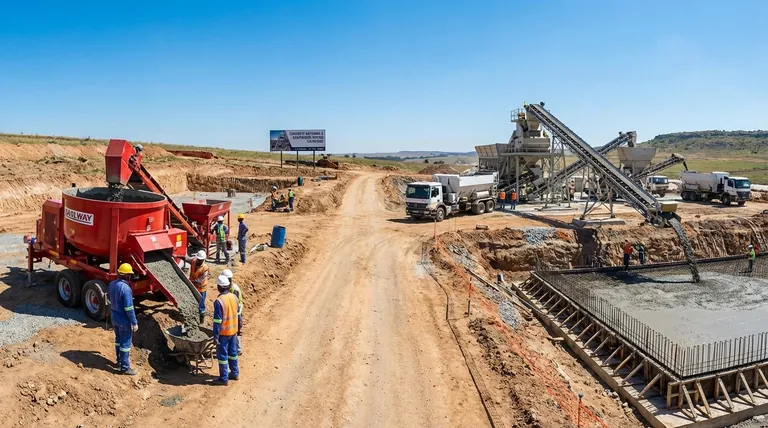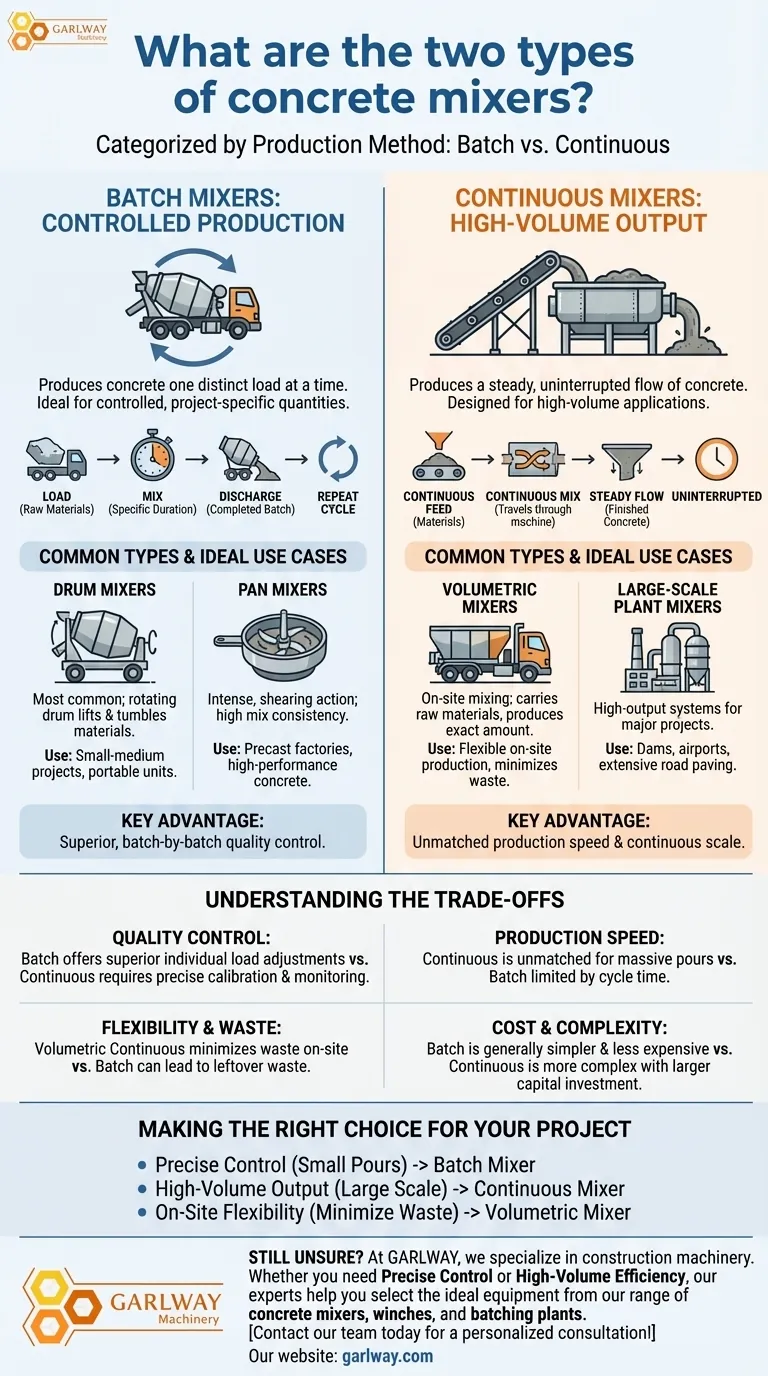Fundamentally, concrete mixers are categorized by their production method. The two primary types are batch mixers and continuous mixers. Batch mixers produce concrete one distinct load at a time, making them ideal for controlled, project-specific quantities. In contrast, continuous mixers produce a steady, uninterrupted flow of concrete, designed for high-volume applications.
The critical distinction is not about which mixer is superior, but which production model—single, controlled loads versus a constant, high-volume stream—aligns with the demands of your specific project.

Batch Mixers: The Standard for Controlled Production
Batch mixers are the most common type, defined by their process of mixing ingredients together to form a single, finite batch. Once that batch is mixed and discharged, the process begins again for the next one.
How They Work
The operational cycle is simple and direct. All raw materials (cement, aggregates, water) are loaded into the mixer, mixed for a specific duration to achieve uniformity, and then the entire completed batch is discharged. This cyclical process allows for extremely precise quality control over each individual load.
Common Sub-Types
While "batch mixer" is the category, it includes several common designs.
- Drum Mixers: These are the most recognizable type, using a rotating drum with internal fins or paddles to lift and tumble the materials. They include tilting, non-tilting, and reversing drum varieties, common on everything from small portable units to large mixer trucks.
- Pan Mixers: These use a stationary pan with rotating paddles or stars inside to create a more intense, shearing mixing action. They are favored for producing high-performance or precast concrete where mix consistency is paramount.
Ideal Use Cases
Batch mixers are the workhorse for small to medium-sized construction projects, precast concrete factories, and any application where the quality of each specific load must be tightly controlled and verified.
Continuous Mixers: The Solution for High-Volume Output
As the name implies, continuous mixers operate without stopping. They are engineered for large-scale projects where a massive, uninterrupted supply of concrete is required.
How They Work
Materials are continuously fed into one end of the mixer. The mixing occurs as the materials travel through the machine, and a constant stream of finished concrete is discharged from the other end. The process runs until the job is complete or paused.
Common Sub-Types
This category includes large-scale industrial equipment and specialized mobile units.
- Volumetric Mixers: Often mounted on a truck, these machines carry raw materials in separate compartments. They mix the materials on-site and on-demand, allowing the operator to produce the exact amount of fresh concrete needed, right at the pour site.
- Large-Scale Plant Mixers: These are stationary, high-output systems used for major civil engineering projects like dams, airports, or extensive road paving, where production speed is the primary driver.
Ideal Use Cases
Continuous mixers are essential for large construction sites, roadwork, and remote projects that require a significant and steady flow of concrete over an extended period.
Understanding the Trade-offs
Choosing between these two types involves clear trade-offs in control, speed, and flexibility.
Quality Control
Batch mixers offer superior, batch-by-batch quality control. It's easy to test and adjust each individual load. Continuous mixers require precise initial calibration and constant monitoring to ensure consistency over a long production run.
Production Speed & Scale
For sheer volume, continuous mixers are unmatched. Their ability to produce a non-stop flow is essential for massive pours. Batch mixers are inherently limited by their cycle time of loading, mixing, and discharging.
Flexibility & Waste
Volumetric continuous mixers offer maximum flexibility. By mixing on-site, they produce only what is needed, drastically reducing the waste associated with leftover concrete. Batch mixers can lead to waste if a full batch is mixed but not entirely used.
Cost & Complexity
Generally, batch mixers are simpler in design, less expensive to purchase, and easier to maintain. Continuous mixing systems are more complex, representing a significantly larger capital investment.
Making the Right Choice for Your Project
Your project's specific goals will dictate the correct choice.
- If your primary focus is precise quality control for smaller, defined pours: A batch mixer, such as a drum or pan type, offers the best control over each individual load.
- If your primary focus is high-volume output for large-scale projects: A continuous mixer is the only practical solution for maintaining a steady, uninterrupted flow of concrete.
- If your primary focus is on-site flexibility and minimizing waste: A truck-mounted volumetric mixer, a type of continuous mixer, allows you to produce fresh concrete on demand.
Understanding this core distinction between batch and continuous production empowers you to select the right tool for the job, ensuring both efficiency and quality.
Summary Table:
| Feature | Batch Mixer | Continuous Mixer |
|---|---|---|
| Production Method | Produces concrete one load at a time | Produces a steady, uninterrupted flow |
| Ideal For | Small to medium projects, precise quality control | Large-scale projects, high-volume output |
| Key Advantage | Superior batch-by-batch control | High production speed and on-site mixing (volumetric) |
| Common Types | Drum Mixers, Pan Mixers | Volumetric Mixers, Large-Scale Plant Mixers |
Still Unsure Which Concrete Mixer is Right for Your Project?
At GARLWAY, we specialize in providing the perfect construction machinery solutions for contractors and construction companies worldwide. Whether you need the precise control of a batch mixer or the high-volume efficiency of a continuous mixer, our experts can help you select the ideal equipment from our range of concrete mixers, winches, and concrete batching plants.
Let us help you maximize efficiency and quality on your next job. Contact our team today for a personalized consultation!
Visual Guide

Related Products
- Ready Mixer Machine for Construction Ready Mix Machinery
- Portable Concrete Mixer Machine Equipment for Mixing Concrete
- HZS35 Small Cement Concrete Mixing Batch Plant
- Commercial Construction Mixer Machine for Soil Cement Mixing Concrete
- Hydraulic Concrete Mixer Machine Cement Mixing Equipment for Mixture Concrete
People Also Ask
- What is the average lifespan of a concrete mixer? Maximize Your Equipment's Lifespan & ROI
- What was significant about Roscoe Lee's 1934 concrete mixer design? Pioneering Modular Construction Equipment
- When was the first concrete mixer developed and by whom? Discover the 1900 Breakthrough
- Can a concrete mixer be used for mortar? Understanding the trade-offs for your project
- Why is the manufacturer's strength and service important when choosing a concrete mixer? Ensure Long-Term Project Success



















